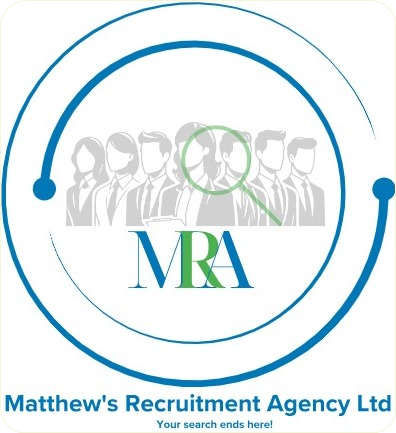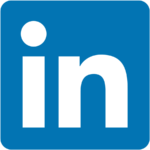Interview Preparation
- Home
- Interview Preparation
Interview Tips
Preparing for your interview :
Researching the Organization
Before your interview at Matthew’s Recruitment Agency Ltd., it’s crucial to gather relevant information about the company. This preparation will help you answer questions confidently and demonstrate your interest in the role.- Company Details:
- Understand their services/products, company size, revenue, and employee count.
- Brand and Goals:
- Learn about their brand identity and overarching objectives.
- Culture and Values:
- Familiarize yourself with their company culture and core values.
- LinkedIn Insight:
- Research senior leaders on LinkedIn to understand their roles and backgrounds.
- Future Plans:
- Discover their upcoming business strategies and growth plans.
Ensure a smooth interview experience by being punctual and well-prepared
- Confirm Interview Details:
- Ensure you know the interview date, time, and location. Familiarize yourself with who to contact upon arrival.
- Know Your Interviewer:
- Research and remember the name and title of your interviewer to establish rapport.
- Plan Your Travel:
- Map out your route in advance and factor in sufficient travel time to arrive punctually.
- Organize Required Documents:
- Prepare any requested documents such as passport, certificates, or references well ahead of the interview.
By adhering to these guidelines, you can minimize stress and present yourself professionally during your interview at Matthew’s Recruitment Agency Ltd.
Presentation is important
Your appearance can make a significant impression during your interview. Follow these guidelines to ensure you present yourself professionally
- Dress Code Clarity:
- Seek clarification if unsure about the appropriate attire beforehand.
- Smart Attire:
- Aim for a smart and professional appearance, erring on the side of formality if in doubt.
- Overdressing vs. Underdressing:
- It’s preferable to overdress rather than underdress, ensuring you look polished and well-groomed.
By dressing appropriately, you demonstrate respect for the interview process and align with the professional standards expected at Matthew’s Recruitment Agency Ltd.
Get Acquainted with Your CV
Your CV got you in the door, so it’s important to be well-acquainted with its details. Read and re-read it before the interview to ensure you know it thoroughly – this should be simple if it accurately represents your accomplishments and previous experiences.
Since your interviewer will use your CV as a guide during the interview, it’s essential to know it well and trust that your experience makes you a strong candidate for the job.
During the interview :
Stay Positive, Polite, and Confident
From the moment you step into the building, ensure you are polite and engaging with everyone you meet. Every interaction counts, not just the one with your interviewer.
Once seated, demonstrate your confidence. Maintain good posture, make confident eye contact, and keep your nerves in check to communicate clearly. This will show the interviewer that you are confident in your ability to perform the job and that you can handle pressure.
Be an attentive listener as well. Show that you are actively listening by maintaining eye contact and nodding or giving small verbal cues like “yes” and “uh huh” when the interviewer is speaking.
Mastering Interview Responses
To show your expertise effectively, you need to appear confident and knowledgeable. Avoid giving short answers that might prompt further questions, but also don’t talk excessively, which can confuse the interviewer.
To keep your answers concise and impactful, use the STAR method. For each competency question, explain the Situation, Task, Action, and Result.
Situation: Describe the context or task you needed to address.
Task: Explain the objective you aimed to achieve.
Action: Detail the steps you took to handle the situation and reach the goal, focusing on your specific contributions.
Result: Share the outcomes of your actions, highlighting your achievements and lessons learned.
Inquire Thoughtfully
At the end of the interview, you’ll likely be asked if you have any questions. It’s smart to prepare questions about things you want to learn more about, as the interview is also an opportunity for you to determine if the job suits you. Consider asking about topics that caught your interest during the conversation. This shows that you were actively listening and engaged with what was being discussed. Asking questions is crucial because it demonstrates your genuine interest in the company and the role. It shows that you care and are eager to learn more. Here are some example questions you could ask in an interview:- What does a typical day in this role look like?
- Who will I be collaborating with?
- Why is this role currently open?
- How will my performance be evaluated?
- How does this department fit into the organization as a whole?
- What is the company’s policy on development and training?
- Do you have any concerns about my ability to succeed in this role?
Showcase Your Personality
Interviews are not just about assessing skills; they’re also about finding the right personality and cultural fit.
It’s crucial to be yourself and let your personality shine through, so both you and the interviewer can determine if you’d be a good match for the team and the company. Ultimately, you want to work somewhere you’ll enjoy.
To achieve this, avoid over-preparing. To reveal your true self, you need to be confident enough to react, engage, and improvise. Over-preparation can make you appear robotic or stiff.
Interview Pitfalls to Avoid
Avoid Speaking Negatively About Previous Employers: While there may be aspects of past jobs you disliked, frame your reasons for leaving positively. For instance, mention that you seek new challenges and growth opportunities.
Stay Calm and Focused: Refrain from fidgeting or appearing distracted during the interview.
Don’t Show Excessive Concern for Rapid Advancement: Focus on the role and your potential contributions rather than immediate promotions.
Have a Clear Career Plan: Lack of goals can suggest you’re not serious about the job or view it as a temporary position.
Delay Salary Discussions: Bringing up money too soon can imply it’s your primary concern. There will be time for salary negotiations if you advance in the process.
Turn Off Your Mobile Phone: Ensure your phone is off to avoid interruptions during the interview.
Avoid Expressing Prejudices or Intolerance: Keep your communication professional and inclusive.


